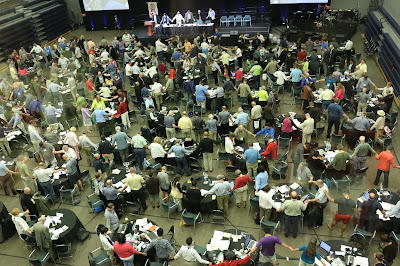It was a privilege
to serve as the ecumenical representative of the Presbyterian Church, (USA) at
the gathering of the General Synod of the Reformed Church in America as they
met from June 11-16 on the campus of Trinity Christian College outside of
Chicago, Illinois. What follows is a
summary of the actions I observed and some of the dynamics I perceived from the
meeting.
Human
sexuality and in particular issues related to homosexuality took center stage
in primary actions and hallway conversations of the delegates. There was a recommendation from the President
of the Synod to create a special council that would propose a constitutional
way forward on many of the issues of concern and disagreement amongst members
of their communion. The special council
was approved after debate that demonstrated two opposing perspectives: one
perspective was eager to define an unambiguous set of boundaries regarding
human sexuality; another perspective was concerned to allow sufficient time for
deep discernment and consensus without a rush to action. Hallway conversation perceived the special
council as a means by which more timely definition would be accomplished with
many pleased and many concerned about that prospect.
Transformed
and transforming leadership was the goal and theme of much of the Synod
gathering. There were many examples of
ways that the leadership of the RCA was building initiatives that would change
patterns and practices of Christian witness that would more effectively engage
the society in which we minister. One action of particular note was the
acknowledgement of “Missional Impact Partners.”
Many compelling stories were shared of ways that ministry was entering
communities that have been otherwise neglected to be reached through new
patterns of innovation. One fascinating
story described a ministry in Benton Harbor set in a neighborhood rife with
drug dealing. So much activity was going
in and out of the Pastor’s home that the police came knocking with false
assumptions, not knowing that there was a lively and active bible study taking
place each day with ex-convicts, dealers, and others from the neighborhood.
Judicial
actions of the Reformed Church of America do find their way to the floor of the
General Synod. As such, there were some
decisions undertaken with regard to homosexuality that elicited much heartfelt
debate. The frustrations shared during
debate reflected some of the eagerness involved with the choices made for the
special council on constitutional action.
An
ecumenical panel was center stage on an evening in which I joined other
ecumenical partners for a valuable dinner of sharing and prayer. The ecumenical panel included representatives
of Roman Catholic, Orthodox, and Pentecostal traditions that were widely well
received by delegates to the Synod. This
panel was unique for the RCA in the sense that its focus was not upon the
formula of common agreement partners such as the PCUSA, UCC, and ELCA (all of
whom were represented along with a representative of the CRC). Also,
during the Synod plenary meeting, an inter-religious task force was established for
the first time to explore relations between Christians and people and groups of
other religions.
Chiapas and
a few other regions of the world were given special focus and recognition. The ministry in Chiapas was a thorough and
historic effort by the RCA. That mission
was acknowledged as having established a robust indigenous ministry and thus
the RCA missionary effort was completed and celebrated. The commitment and imagination of these
retiring missionaries was remarkable and impacting.
Armenian
genocide was acknowledged and lamented by special action affirming solidarity
with the Armenian people both victims and survivors. This action paralleled the efforts of the
PCUSA and other ecumenical partners.
Presbyterian links to the RCA were underscored in many sincere hallway conversations. Our ties were formally acknowledged on the rostrum during the ecumenical report. The formula of agreement remains a continuing and viable form of exchange for ministry and witness. While the stance of the RCA on matters of homosexuality now differs from the PCUSA and other formula of agreement partners, those differences were not cuase for any diminuition of formal ties and ministry. Of course, during floor debate on some contested issues, there were broadly generalized characterizations of choices and consequences in our denomination and other partners. However, none of those comments appeared to sway the very positive spirit of cooperation and mutual appreciation that was facilitated by RCA staff and delegates.
Presbyterian links to the RCA were underscored in many sincere hallway conversations. Our ties were formally acknowledged on the rostrum during the ecumenical report. The formula of agreement remains a continuing and viable form of exchange for ministry and witness. While the stance of the RCA on matters of homosexuality now differs from the PCUSA and other formula of agreement partners, those differences were not cuase for any diminuition of formal ties and ministry. Of course, during floor debate on some contested issues, there were broadly generalized characterizations of choices and consequences in our denomination and other partners. However, none of those comments appeared to sway the very positive spirit of cooperation and mutual appreciation that was facilitated by RCA staff and delegates.
Faithfully,
Brian R. Paulson
Pastor, First Presbyterian Church of Libertyville, Presbytery of Chicago
(Brian was appointed by the Stated Clerk of the PCUSA, Gradye Parsons, as the Ecumenical representative to the General Synod 2015 our partner communion, the RCA.)




